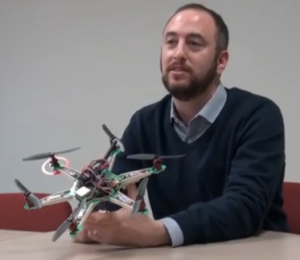 I recently interviewed drone hobbyist, educator, and speaker Timothy Reuter. I asked him about his work to educate the public about drones, make drones more accessible to a wider, as well as about his thoughts on the future of drones.
I recently interviewed drone hobbyist, educator, and speaker Timothy Reuter. I asked him about his work to educate the public about drones, make drones more accessible to a wider, as well as about his thoughts on the future of drones.
Lauren Peterson: Can you introduce yourself and some of the work that you’ve done?
Timothy Reuter: Sure, my name is Timothy Reuter, and I’m the founder of the Drone User Group Network which is an association of community organizations dedicated to teaching people how to build and operate their own drones and to promoting the socially beneficial applications of unmanned aerial vehicles. I’m also the co-founder of Drone U, which is an online educational platform.
Lauren Peterson: How did you come to be so involved with drones?
Timothy Reuter: I first got involved about two and a half years ago when I started reading about low-cost UAV kits on the internet and I decided I wanted to build one myself. So, I bought it, found it a little harder to put together on my own than I had anticipated and so I thought if I could form a community, I could find people to teach me. Originally I had thought this was a pretty esoteric activity so I thought I’d be lucky to find fifty people who were interested in this seemingly niche endeavor and now the network has grown to about 6,000 people. Everyday there is new interest, so what started off as a seemingly niche hobby has gone very mainstream.
Lauren Peterson: So, what inspired you to found Drone University?
Timothy Reuter: My co-founder and I were frustrated by how shallow a lot of the media coverage seemed to be. Most of it was either very alarmist, or simply stating that people were doing this and we wanted to get some more thoughtful voices out into the public. Even though each of us has our own positions, we’ve tried to bring perspectives from all different sides on a variety of issues to public attention.
Lauren Peterson: What significant obstacles have you faced while making drones more accessible to people?
Timothy Reuter: Oh, there’s a few different obstacles. The first are social and legal. There is still a lot of concern that people have about safety and privacy, some of which is founded and some of which is, I think, based on preconceived notions of what military drones are that people assume are the same for civilian drones. The second is the technology is still evolving rapidly and these systems aren’t quite as easy to use yet as we would like to see them. But, I think in a few years it’ll be something that’s really accessible to everyone. Right now, anybody can do it if they’re willing to put in the time to learn it, but I think in two or three years, a lot of this stuff will really be foolproof, and we’ll have a lot more safety features built in to help protect people from themselves.
L.auren Peterson: What current or future drone innovation really excites you the most?
Timothy Reuter: Sure, so I think what we’re going to see is a lot more automated flight where you just give the system high level instructions and it does what you want it to do. Right now there are two main ways that people control drones. One is you can control it manually, which can be a lot of fun but also introduces the opportunity for significant human error. And the other way is people programming GPS waypoints, but that still requires a certain degree of technical knowledge. So, what i’d like to see is you can give your drone a voice command something like, “drone go and take a selfie of me and my friend” or “drone go and check the gutters on my roof for leaks.” And then it will just do it without you having to do any programming or manual intervention. So that’s something I’m very excited about.
Lauren Peterson: You mentioned that the current media and many sources of information from which the public learns about drones are often shallow and inaccurate. What can be done to change that?
Timothy Reuter: So, I think the good news is actually the quality of information and discourse has actually improved significantly since we originally founded Drone U. But a lot of people are still mapping their fear of government surveillance and military technology onto drones. So, sometimes when they say they are talking about drones, they’re really talking about a whole bunch of other phenomena that are happening in our society that, because drones are new and exotic, they then associate with this technology. But I think when we have drones in our environment that are beginning to do things for us on a regular basis, like Amazon or Google delivery drones, that’s really going to change people’s perspective because, right now, drones are something that’s rather abstract that they read about. Once it’s something that is part of our lives, I think that is going to significantly change the way people think and talk about them.
Lauren Peterson: Tell me about some of your future plans in the drone community.
Timothy Reuter: Sure, so I’d like to do more community service efforts with drones. In 2013, we had a drone community service month, where we had UAVs help with beach cleanups; identifying areas where there was trash. Also, having some STEM [science, technology, engineering, mathematics] education initiatives with drones. We also did a drone social innovation award which was a $10,000 cash prize for a socially beneficial use of a low cost drone. And we’d like to both continue doing those initiatives ourselves as well as inspiring more and more people to think about how can they take their drones out into their communities, to use them to make the world a better place.


